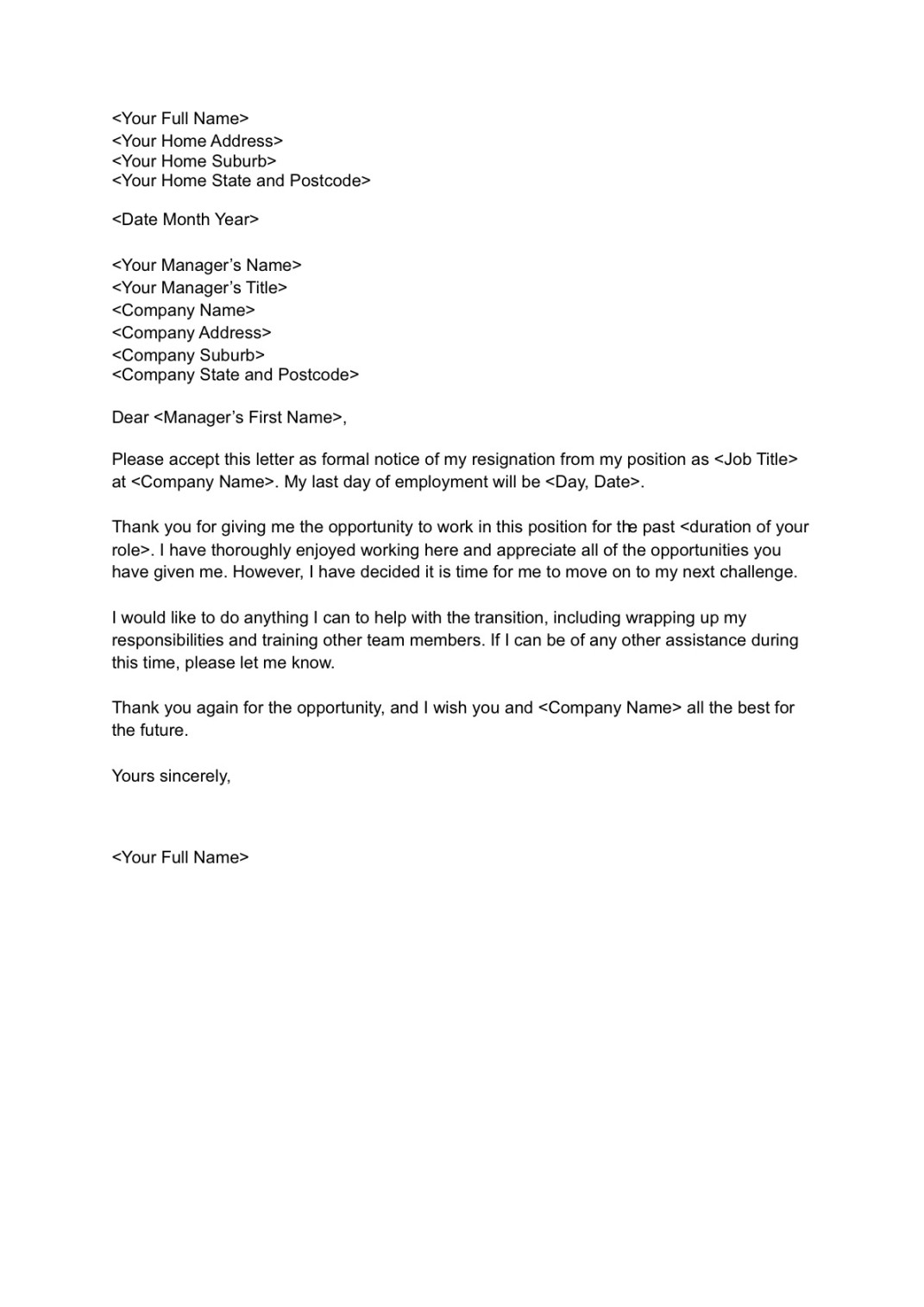This guide will delve into the essential elements of crafting a professional Draft letter of Resignation Template in formal English using WordPress. We’ll explore design considerations that effectively convey professionalism and build trust with your audience.
1. Purpose and Audience
The primary purpose of a Draft Letter of Resignation Template is to provide a standardized framework for employees to easily draft their own resignation letters. It serves as a valuable resource within an organization, streamlining the resignation process and ensuring consistency in communication.

Image Source: seeklearning.com.au
The target audience for this template is primarily internal – employees within the organization who may need to resign at some point. Therefore, the template should be easily accessible and user-friendly for all employees, regardless of their technical proficiency.
2. Key Components of the Template
A well-structured Draft Letter of Resignation Template should include the following key components:
Date

Image Source: seeklearning.com.au
This section should be a dynamic field that automatically inserts the current date when the employee accesses the template. This ensures that the resignation letter is always up-to-date.
Recipient Information
This section should include fields for the employee to enter the name and title of their immediate supervisor, as well as the department head or other relevant recipients.
Subject Line
The subject line should be concise and informative, clearly stating the purpose of the letter, such as “Resignation – [Employee Name]”.
Salutation

Image Source: seeklearning.com.au
The salutation should be formal and respectful, such as “Dear [Supervisor Name],” or “To Whom It May Concern,” if the specific recipient is unknown.
Resignation Statement
This is the core of the letter. The employee should be able to easily insert their resignation statement here. The template can provide a basic framework, such as:
> “Please accept this letter as formal notification that I am resigning from my position as [Job Title] at [Company Name], effective [Effective Date].”
Reason for Resignation (Optional)
While not mandatory, including an optional field for the employee to briefly state their reason for resignation can be beneficial for the employer. This information can be valuable for understanding employee turnover and making necessary improvements.
Gratitude and Appreciation
This section allows the employee to express their gratitude for the opportunities and experiences gained during their employment. A sample sentence could be:
> “I would like to express my sincere gratitude for the opportunities I have been given during my time at [Company Name].”
Future Availability
The employee can specify their availability for a handover period to ensure a smooth transition of responsibilities.
Closing Remarks
This section typically includes a professional closing, such as “Sincerely” or “Best regards,” followed by the employee’s typed name and signature.
Contact Information
The employee’s contact information, such as their phone number and email address, should be included at the end of the letter.
3. Design Considerations for Professionalism and Trust
The design of the Draft Letter of Resignation Template plays a crucial role in conveying professionalism and building trust with employees. Here are some key design elements to consider:
Clean and Minimalist Layout
A clean and minimalist layout enhances readability and reduces distractions. Avoid excessive use of colors, fonts, and graphics.
Professional Font
Choose a professional and easy-to-read font such as Arial, Calibri, or Times New Roman. Avoid overly decorative or difficult-to-read fonts.
Consistent Formatting
Maintain consistent formatting throughout the template, including font size, line spacing, and paragraph indentation. This creates a professional and polished look.
Clear and Concise Language
Use clear, concise, and formal language throughout the template. Avoid jargon and technical terms that may be unfamiliar to some employees.
Easy Navigation
The template should be easy to navigate and use. Utilize clear headings and subheadings to guide employees through the different sections.
Accessibility
Ensure the template is accessible to all employees, including those with disabilities. This may involve using appropriate font sizes, sufficient color contrast, and keyboard navigation options.
Branding
Incorporate subtle branding elements, such as company colors and logos, to maintain consistency with the overall company brand.
4. Implementing the Template in WordPress
WordPress offers several options for creating and implementing the Draft Letter of Resignation Template:
WordPress Pages
Create a dedicated WordPress page for the template. This allows for easy access and management within the company’s intranet or employee portal.
WordPress Forms
Utilize a WordPress form plugin to create an interactive form that guides employees through the letter-writing process. This allows for dynamic field updates and automated email notifications.
WordPress Blocks
Leverage the flexibility of WordPress blocks to create a visually appealing and interactive template. This approach offers greater control over the layout and design.
5. Ongoing Maintenance and Updates
Regularly review and update the Draft Letter of Resignation Template to ensure its accuracy and relevance.
legal and Compliance: Keep the template updated with any changes in employment laws or company policies.
By carefully considering these elements, you can create a Draft Letter of Resignation Template that is both professional and user-friendly, empowering employees to effectively communicate their resignation while maintaining a positive and professional relationship with the company.